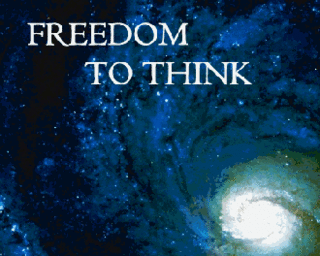 4
comments
|
Sunday, October 30, 2005
4
comments
|
Sunday, October 30, 2005
Atheists such as Cenk Uygur, from the Huffington Post, give no credit, or respect for that matter, to Christians or any other theistic person. For example in: If You're a Christian, Muslim or Jew - You are Wrong he writes:
After a somber assault and merciless degrading of the three monotheistic religions, Uygur closes with the following statement:There is no damn Easter Bunny. There is no Jesus waiting to return. Moses never even existed. These were all convenient lies from the men of those times to gain power. Their actions were rational -- they wanted to deceive their brethren so that they could amass power. I get their motivations. But I cannot, for the life of me, understand our motivations, thousands of years later, still following the conmen of yesteryear into our gory, bloody, violent end.
If you don't want to be called ignorant or misinformed, then get informed. Learn the real nature of our universe and put aside old wives tales about resurrected Gods, omniscient prophets and a guy who could split the Red Sea but couldn't find where he's going in the desert for forty years.I have no desire to address Uygur’s contemptible post; it only confirms my assertion of the pendulum view of Christianity. Besides, Jesus said, "Give not that which is holy unto the dogs, neither cast ye your pearls before swine, lest they trample them under their feet" Matthew 7:6. In order to escape the challenges of skeptics, Christians have been retreating—and hiding behind “faith” (in the pejorative sense). In part, this is driven by fear of confrontation and more often than not—lack of knowledge. In fear of being humiliated; the claims of the bible become “true for me” or “just personal” and a dichotomy is drawn between reason and faith. It’s one thing to still be examining difficult issues with biblical and philosophical matters—I am always excavating new challenges myself; we all face difficult questions that sometimes leave us perplexed. But this is no reason to crawl into the fetal position; it just means more investigation and thoughtful analysis is warranted. Intellectual cowardice only fuels the unconstructive and pessimistic view of Christianity, such as Cenks.
It's the year 2005. Let's start acting like it.
Candidly, I am becoming nauseous of this depiction—that all Christians think this way (as Cenk purports) and are willingly ignorant or just stupid. Millions of people believe things that are true or false for either silly or valid reasons; but the truth or falsity of those beliefs should not and cannot be assessed exclusively on the conspicuous futility of thoughtlessness. In 100% man 100% God, Greg Koukl articulates his frustration of this passive intellectualism. He writes,
Part of my concern over the last fifteen years, more and more so of late, is the way Christians take a very one dimensional approach to problems. This one dimensional approach can be summed up with the phrase "Just trust God" or "The Bible says it, I believe it and that settles it." Now, obviously there's nothing whatsoever wrong with trusting God. And there's nothing whatsoever wrong with believing the Bible because it happens to say it and that would settle it. The problem is that those aren't usually the only factors involved. The concept of trusting God may be a little bit vague in some circumstances. But what it actually means to trust God and what the relationship is of our trust to God and our own personal responsibility to behave and make decisions in the Christian life has to be worked our more carefully.
I will tell you something; when I first became a Christian this was something that absolutely drove me nuts. As I was seeking to try and walk the Christian life and to do the things that I was supposed to do, I would frequently get comments from other people who said, "Don't try to live the Christian life, just trust God. Let Jesus do it through you." It drove me nuts because I'm the kind of person--you can probably guess--who likes to sink my teeth into something. If I'm going to get directions, I want them to be clear and do-able. To me those kinds of comments were simply too broad and general. They were just like cotton candy. You go for a big bite of this huge fluff and you snap your teeth on your teeth because that which was there dissolves into nothing in your mouth. This kind of advice was that way for me.
"Let Jesus do it." What does that mean? When my alarm goes off, do I get out of bed? Do I stand up, brush my teeth or do I say, "Okay, Jesus, do it for me." Do I get up and pray or does Jesus pray for me? Sometimes that very one dimensional kind of response, which ultimately tells us nothing and teaches us nothing, and equips us in no way, is something that Christians often fall back on when faced with difficult ethical decisions. Though I understand the motivation in many cases is to honor God, I think that often substitutes not only for clear thinking but also for genuine Christian thinking and a genuine Biblical response.
This debate between faith and reason is in many ways the decisive battleground between theism and atheism, and as Koukl articulates, this is because most defenses of theism appeal to the inadequacy of reason. But are there no grounds for faith?
Thomas Aquinas was the greatest medieval philosopher in his time. He tried to show the harmony between faith and reason, and between Christianity and philosophy. He asserts that from reason, we can know that there is a God and that there is only one God; these truths about God are accessible to anyone by experience and logic alone, apart from any special revelation from God.
Despite qualitative evidence for Christianity some will still not believe because faith is not something that one can be entirely persuaded into. People walked away from Jesus; why should we expect everybody to fall to their knees when they hear the truth—even the most powerful and constructive arguments can be futile. Faith in Jesus starts with knowledge (for one cannot have faith in someone they know nothing about, or sense the need for a savior if they do not recognize that they are a sinner, etc.), but after an objective mental persuasion (the evidences seen thereof) there must be a subjective step (that which cannot be seen) of personal faith in Christ for salvation. We can never reason someone into salvation; we can only provide them sufficient enough evidence to grant them confidence that when they take that step of faith in Christ; they are not stepping into the thin air of fairly-tales, but on the firm ground of reality and truth.
Faith builds on reason. Since faith and reason are both ways of arriving at truth -- and since all truths are harmonious with each other -- faith is consistent with reason. If we understand faith and reason correctly, there will be no conflict between what faith tells us and what reason tells us.
It is through examining our faith that we will grow stronger in our faith. Personally, I have spent a great deal of time examining philosophical and religious positions and arguments that are contrary to my beliefs. I recently purchased Bertrand Russell’s book, Why I am not a Christian, and look forward to reading it. In my experience, after examining and evaluating all the various claims, I am absolutely convinced that Christianity is truth. If the rest of the world is to recognize the intellectual rigor of Christianity—we better stop acting like fools for the world to slander, and figure out why we believe what we do.
Labels: Apologetics, Atheology, Christianity, Faith



